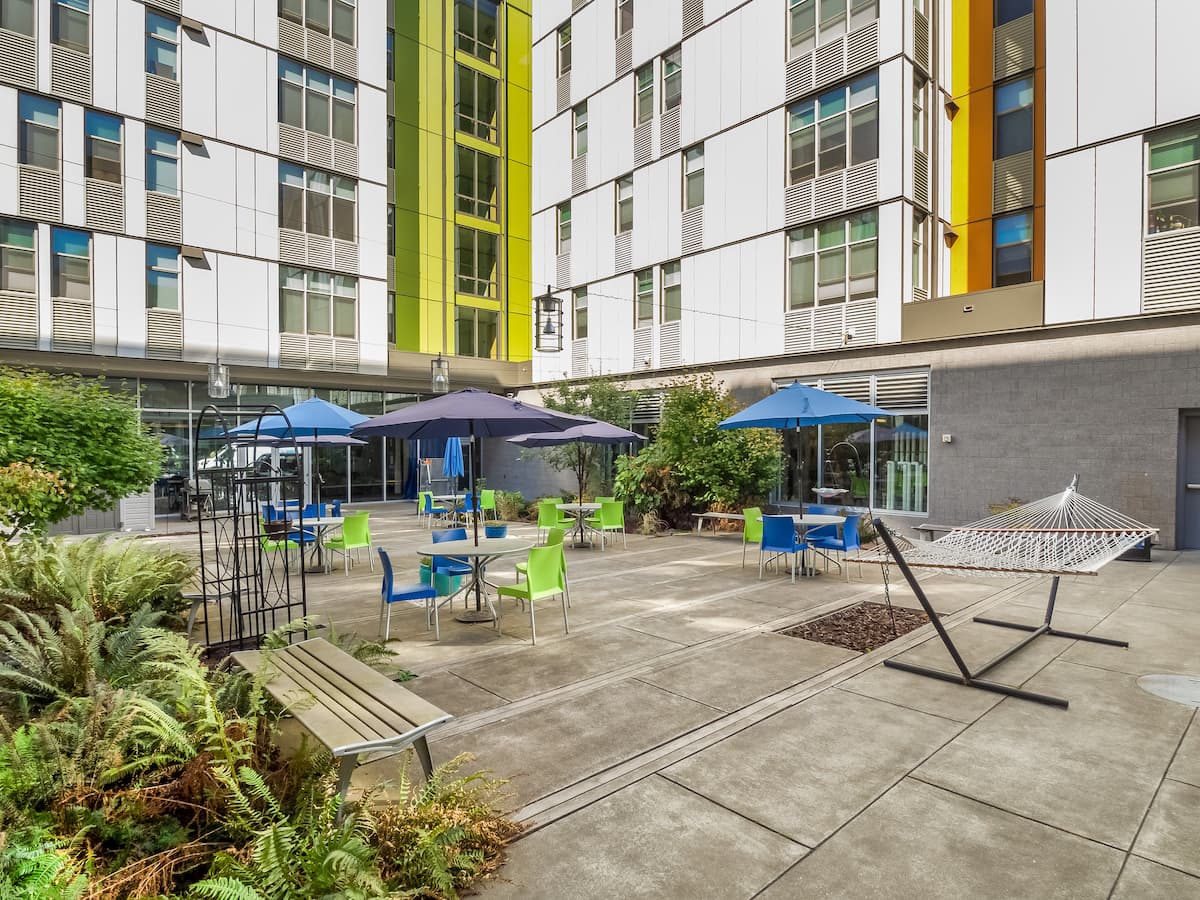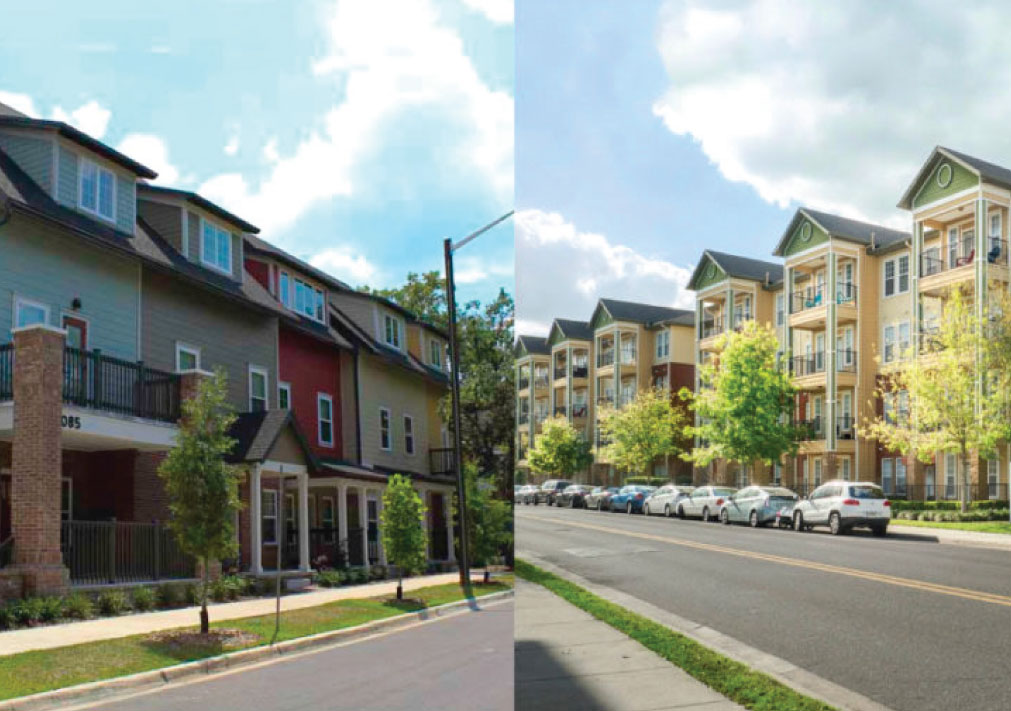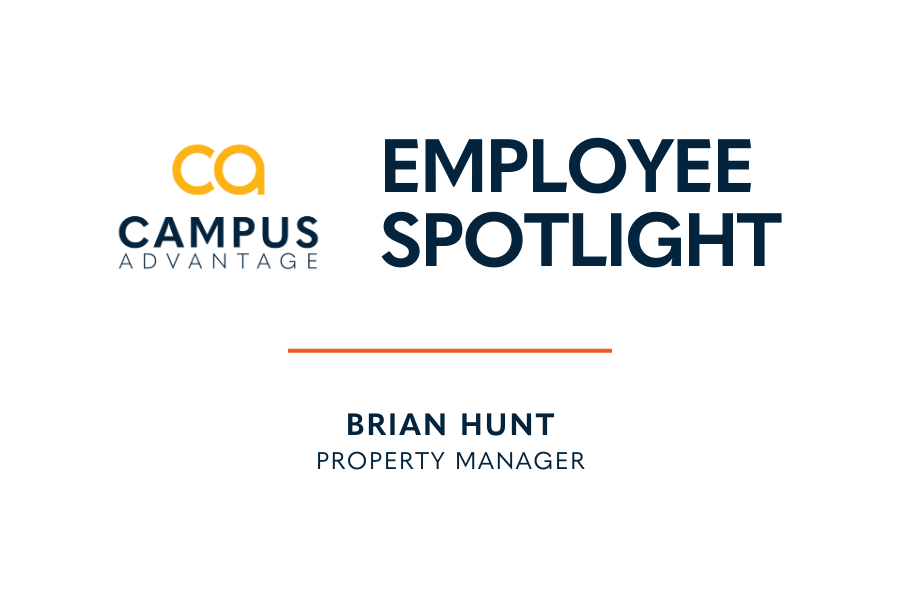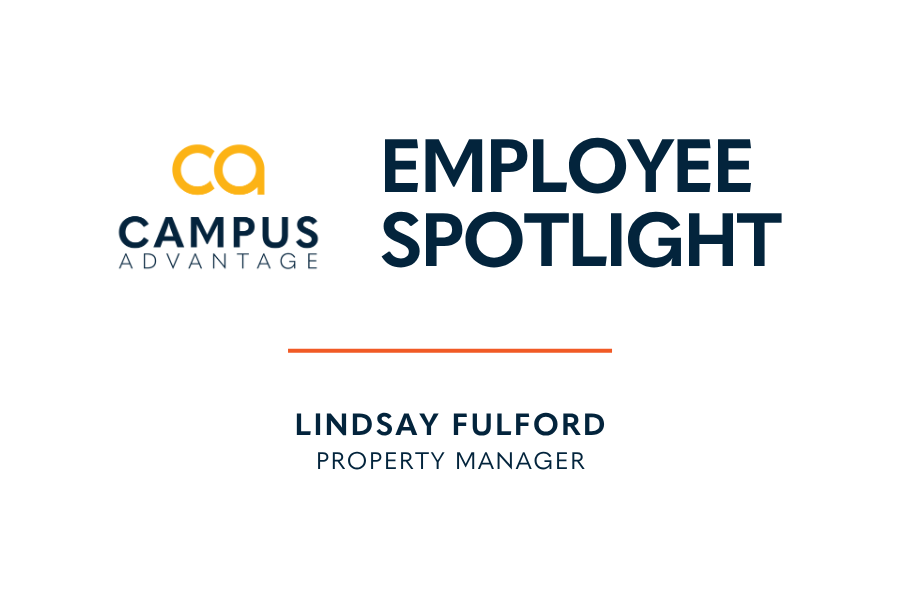Looking To
Expand Your Portfolio?
In the student housing sector, investments have gained significant momentum within the past decade and will continue to do so as this sector rapidly expands and becomes a mainstream investment category for institutional capital looking to diversify their portfolio and provide downside protection in their real estate holdings against any potential recession. If you are looking to expand your portfolio, purpose-built student housing is a prime, valued-added opportunity with explosive growth and tremendous investment benefits.



Current Opportunity
Campus Advantage Student Housing Fund I, LP
Campus Advantage Student Housing Fund I, LP (CASH Fund or the Fund) offers investors the opportunity to invest in a diversified pool of student housing assets across the country. The Fund objective is to invest in 6-10 student housing assets as a general partner (GP or Sponsor) alongside passive investors (Limited Partners or LPs) in joint venture relationships. Under these joint ventures, the LPs will provide anywhere between 80%-97.5% of the required equity for an investment and the Fund will provide anywhere between 2.5%-20% of the required equity. This structure allows CASH Fund investors to leverage their capital into approximately $285-$300 million in student housing assets through debt financing and equity partnerships with LPs. In exchange for the expertise and deal flow from CASH Fund, these joint ventures with LPs will provide the opportunity for CASH Fund to earn an outsized portion of the profits of an investment upon achieving certain return hurdles as defined in the joint venture agreements. These outsized portions are referred to as Promoted Interests. A typical Promoted Interest structure provides excess distributions to the GP in the range of 10%-30% more than attributable to the GP’s capital contributions to the joint venture. Investment in CASH Fund is an investment in a discretionary investment vehicle whereby individuals will be investing in the overall strategy of building a diversified pool of student housing assets targeting a net internal return to investors. In the case of CASH Fund, the investment vehicle will be seeded with at least one, possibly two, assets, identified prior to investors making commitments to CASH Fund. Other than the initial seed assets, Campus Advantage will be provided the discretion to acquire any investment meeting the overall investment strategy and targeted return profile without approval from Fund investors.

-
Target Fund Size
$10 million -
Targeted Annual Yields
5%–7% paid quarterly -
Target Annualized Return*
16%–18% net of fees -
Life of Fund**
December 31, 2027
*Projected internal rate of return over the life of the Fund.
**Subject to three (3), one-year extensions as approved by the majority of the LP interests.
Why Invest in
Student Housing
Student housing has proven to be very resilient in times of economic recession. In addition to the pure demographically driven demand created by the 18- to 24-year-old population, individuals return to, or stay in, college during recessionary periods because of low job prospects pushing the cost-benefit balance in the direction of additional education rather than immediate employment, thus leading to higher enrollment rates.
Why Invest in Student Housing
- Countercyclical and demographically driven demand
- Low supply ratios with room to grow
- Recession resiliency
- Higher cash yields compared to like investments within the institutional segment of conventional apartments
Student housing is a highly fragmented industry that has seen increasing institutional interest in recent years, with annual sales volume increasing over 200% in a five-year period from approximately $2.95 billion in rolling average in 2013-2014 to $6.12 billion rolling average in 2018-2019. Over the same time period, the asset class has matured with valuation fundamentals increasing, resulting in cap rates decreasing from 6.6% to 5.5%, meaning for the same net operating income investors were willing to pay 20.1% more in 2019 than in 2013. Correspondingly, price per bed also grew from $50.6K per bed to $83.8K per bed from 2013 to 2019.1
As student enrollment rates at universities continue to grow, so does the demand for housing. As of fall 2017, enrollment at four-year degree-granting public and not-for-profit universities was 12.9 million students, an increase of approximately 2.2 million students since fall 20082. According to Axiometrics, a market research database, the fall enrollment at the nation’s top 175 colleges and universities will increase by 312,000 while the supply of student housing beds, both on and off campus, will increase by only 219,000 beds, leaving an unmet demand of 92,000 students from fall 2019 to fall 2024.3
In addition, student housing has proven to be very resilient in times of economic recession. People go back to or stay in school because they cannot find work and want to delay paying off student loans, leading to higher enrollment rates. From 2008 to 2010, publicly traded student housing real estate investment trusts (REITs) increased same-store NOI by 8.7%, whereas publicly traded conventional apartment REITS decreased NOI by 6.3%.4
2 NATIONAL CENTER FOR EDUCATION STATISTICS, 2018 DIGEST OF EDUCATION STATISTICS
3 AXIOMETRICS JULY 2019 NATIONAL TIME SERIES
4SEC PUBLIC FILINGS
Why Invest With CA?
- Leading, privately held national platform
- Focused on thorough due diligence, long-term strategy, and infrastructure
- Senior investment team involved in the acquisition and development of over 120 student housing projects
- Realized investment return performance exceeding both the National Council of Real Estate Investment Fiduciaries (NCREIF) Property Index (NPI) and the
- Pension Real Estate Association Investment Property Databank (PREA | IPD) U.S. Property Fund Index
- Partners and clients have included the California State Teachers Retirement System, Florida State Board of Administration, Saban Capital, Lasalle Investment Management, and AIG Real Estate
Founded in 2003 as a third-party management company with a focus on customer service through residence life, Campus Advantage has grown to become a top 10 owner-operator of student housing in the United States1 with a fully integrated platform that delivers results for students, parents, universities, employees, and investors.
Our investment experience began in 2007 when, after successfully transitioning a 17-property portfolio into our third-party management platform, we were asked to assist CalSTRS with continuing to build their student housing portfolio. Since then, Campus Advantage has acquired more than 50 assets, totaling over 28,000 beds and $1.55 billion of gross investments.


The Student Housing
Difference
STRONG MACRO FUNDAMENTALS
As student enrollment rates at universities continue to grow, so does the demand for housing. As of fall 2017, enrollment ar four-year degree-grading public and not-for-profit universities was 12.9 million students, an increase of approximately 2.2 million students since fall 2018. According to Axiometrics, the fall enrollment at the nation’s top 175 colleges and universities will increase by 32,000 while the supply of student housing beds, both on and off campus, will increase by only 219,000 beds, leaving as unmet demand of 92,000 students from fall 2019 to fall 2024.
STUDENT HOUSING NOI VS. TRADITIONAL REIT PORTFOLIOS
Student housing has proven to be very resilient in times of economic recession. People go back to or stay in school because they cannot find work and want to delay paying off student loans, leading to higher enrollment rates. From 2008 to 2010, publicly traded student housing real estate investment trusts (REITs) increased same-store NOI by 8.7%, whereas publicly traded conventional apartment REITs same-store NOI decreased by 6.3%.
IMPROVING VALUATION FUNDAMENTALS
The growth of investor demand has also resulted in improving property valuation fundamentals. From 2013 to 2019, capitalization rates, cap rates, decreased from an average of 6.6% to 5.5% resulting in a 21% increasing in valuation, or 3.1% annual compounded growth rate. This compares to the 1.8% compounded annual growth rate to U.S. CPI over the same period.
INCREASING INVESTMENT DEMAND
Student housing is a highly fragmented industry that has seen increasing institutional interest in recent years, with annual sales volume increasing over 200% in a five-year period from approximately $2.95 billion in rolling average in 2013-2014 to $6.12 billion rolling average in 2018-2019.
INVESTABLE UNIVERSE
We focus on all of the largest and most recognizable university markets. These markets are tracked by Axiometrics, the largest data provider in the industry, and are referred to as the Axio175.
Previous
Case Studies
Below are examples of previous investments made by Campus Advantage in joint ventures with large institutional investors that are representative of the types of assets and strategies that will be targeted by the fund.

Lyons Corner
-
Purchase Price
$21.0 million -
Total Investment
$22.4 million -
Projected Hold Period
Seven (7) Years -
Projected Project Average Cash Yield
8.50% -
Projected Net Fund Average Cash Yield
6.90% -
Projected Project IRR
13.90% -
Projected Net Fund IRR
16.80% -
Projected Project MOIC
2.1x -
Projected Net Fund MOIC
2.6x
Sourced off market by Campus Advantage, Campus View Place (CVP) and Lyons Corner (LC) are two boutique student housing assets in pedestrian-to-campus locations at the University of Florida in Gainesville, Florida. The assets were sold by the original developer and were previously managed by a small, local third-party management company. The assets are complementary product types, with Campus View Place consisting of two- and three-bedroom apartment-style units, and Lyons Corner consisting of two-, three-, four-, and five-bedroom townhome-style units.
The business plan includes strategic operational improvements, including implementing our residence life platform, revenue management to drive effective rents, and restructuring the lease terms to exclude utilities from rents, which is now typical in the market. The properties have historically achieved occupancies in the high 90s due to their pedestrian locations, particularly Lyons Corner, which is near the popular Greek corridor. The Fund strategically partnered with Stark Enterprises on the transaction. Stark Enterprises and CA are in a separate joint venture co-developing another Gainesville project set to deliver in fall 2020. This development is near both properties, allowing the leveraging of additional local resources and increased economies of scale.
Quick Stats
-
Acquisition Date
February 2020 -
Loan-to-Cost
71% (assumption and new loans)
The Beacon
-
Purchase Price
$24.6 million -
Total Investment
$26.4 million -
Loan-to-Cost
60% (new loan) -
Current Book Value
$33.8 million -
IRR (unrealized)
14.0% -
MOIC (unrealized)
2.7x
Acquired in November 2015, The Beacon was 98% occupied at the time of acquisition, having recently gone through a repositioning. The acquisition strategy consisted of completing the renovation, focusing on the common area amenities, and curing deferred capital that the seller could not identify a dollar-for-dollar return upon. Campus Advantage saw the opportunity in capitalizing on the hard work of the unit renovations performed by the prior owner and finishing the product off with a new look/name and refreshed amenity base to provide stable cash flow and steady value appreciation. Upon acquisition, the property was renamed to The Beacon from Eagles Reserve. Throughout the hold period, the property has maintained in excess of 98.0% occupancy, achieving 4.3% compounded rent growth after an initial Year 1 growth rate of 11.1%. Currently, the project is held for long-term investment with a projected 10-year IRR of 15.1% compared to the pro forma of 11.5%.
Quick Stats
-
Investment Strategy
Core+ Acquisition -
Acquisition Date
November 2015 -
Projected Sale Date
October 2025

The Marq
-
Purchase Price
$26.6 million -
Total Investment
$28.3 million -
Loan-to-Cost
40% -
Sale Price
$42.3 million -
IRR
22.9% -
MOIC
2.0x
Originating as an operational assessment for an institutional owner, Campus Advantage was later hired to third-party manage the asset, along with six other assets owned by the investor. Upon marketing the portfolio for sale, Campus Advantage was the successful bidder for a subset of three value-add deals, including The Marq. The property was 81% occupied at acquisition and lacked modern student housing amenities, particularly social spaces and sufficient internet bandwidth. Upon acquisition in March 2014, Campus Advantage invested $1.4 million in capital improvements to update the property, including a complete renovation of the first-floor lobby/clubhouse and laundry facilities, the addition of a computer lab, a yoga studio with Fitness On Demand, a fresh market, and study and tanning spaces. In addition to the physical transformation, the property went through a complete rebrand from 2040 Lofts to The Marq that included a new logo, website, and all advertising materials. With these changes, NOI increased 49% from inception. The project sold for $42.3 million, achieving a 22.9% leveraged IRR and a 2.0x equity multiple.
Quick Stats
-
Investment Strategy
Value-Add Acquisition -
Acquisition Date
February 2014 -
Sale Date
October 2017
Frequently Asked
Questions
WHAT TYPES OF PROJECTS DOES CAMPUS ADVANTAGE INVEST IN?
Campus Advantage invests exclusively in properties that serve students of major universities nationwide. Opportunities are targeted that offer the potential for value enhancement through operational improvements and/or capital investment to enhance the physical asset offering and provide strong, risk-adjusted returns.
WHO CAN INVEST IN CAMPUS ADVANTAGE STUDENT HOUSING FUND I, LP (THE FUND)?
Due to private market investment regulations, investments in the Fund are limited to accredited investors (as defined by the SEC). There is limited liquidity in comparison to public market investments, such as stocks, bonds, and mutual funds, so investors should consult their financial professionals to determine the suitability of the investment to their circumstances.
IS CAPITAL CALLED INTO THE FUNDS AS INVESTMENTS ARE MADE, OR IS THE ENTIRE COMMITMENT DRAWN AT FUND CLOSING? WHEN WILL I NEED TO ACTUALLY WIRE FUNDS?
A 5% deposit is required at Fund commitment. The Fund contemplates making capital calls only at such time that money is needed for an investment. All investor funds will be held in a dedicated account, in accordance with the partnership documents. All contributions from investors to the Fund will be required to be made electronically through an ACH transmittal. Similarly, distributions from the Fund to investors will be made electronically through an ACH transmittal.
WHO CAN I CONTACT WITH QUESTIONS ABOUT AN INVESTMENT OFFERING?
Questions regarding the offering can be sent to [email protected] or to your dedicated Campus Advantage contact.
HOW WILL I BE UPDATED ON THE PROGRESS OF MY INVESTMENT?
Investors will have 24-hour access to a secure, online investor portal containing details of their investments. Investment and Fund performance will be updated quarterly.
WHAT IS A GENERAL PARTNER?
A General Partner (GP) is the managing member of a joint venture between two or more parties and is responsible for managing the day-to-day business of the joint venture. Within the real estate industry, GPs, often referred to as Sponsors, are usually real estate operating companies with experience in a given real estate niche – office, retail, apartments, industrial, or in the case of Campus Advantage, student housing. GPs provide a platform by which outside co-investors (LPs) effectuate their real estate strategies.
A GP has the authority to act on behalf of the business without the knowledge or permission of the other partners in accordance with the governing rights of the joint venture. Unlike LPs, the GP typically takes on the operational risk of the investment, whereas the LPs only take on the investment risk. GPs may be required to take on loan guarantees and other liabilities of the business.
WHAT IS A PROMOTED INTEREST?
A Promoted Interest is a type of incentive-sharing compensation paid to a GP by an LP. It is given in exchange for creating value or bearing a disproportionate share of the downside risk, which may be done in various ways that usually include one or more of the following:
- Locating a profitable investment opportunity
- Bringing useful relationships, expertise, experience, or knowledge to the opportunity
- Providing asset management, construction management, or development management services
- Providing loan guaranties or indemnifications (which may not only involve a greater share of risk, but may also encourage a lender to provide cheaper debt that makes the partnership more profitable)
- Taking responsibility for construction cost overruns
A Promoted Interest generally takes the form of extra distributions made to the GP over and above the distributions attributable to its capital contributions to the partnership. A typical Promoted Interest structure is illustrated below:
- First:
- 90% to the LP and 10% to the GP until an 8% internal rate of return (IRR) is achieved
- Second:
- 80% to the LP and 20% to the GP until the LP achieves an 11% IRR
- Third:
- 70% to the LP and 30% to the GP until the LP achieves a 14% IRR
- Thereafter:
- 60% to the LP and 40% to the GP
WHAT IS A BLIND POOL FUND?
A blind pool is an investment vehicle whereby individuals invest with a company under an overarching strategy without discretion of the underlying investments that will be acquired. In a blind pool, money is raised from investors, usually based on the track record and experience of the party raising the fund. They are usually managed by a GP who has broad discretion to make investments as generally described in the investment offering materials, or Private Placement Memorandum (PPM). A blind pool typically has a stated investment strategy as to the types of investments it will make and the potential returns.
In the case of Campus Advantage Student Housing Fund I, the investment vehicle will be a semi-blind pool with the Fund already having acquired two assets before taking outside commitments from investors like you.
WHAT FEES ARE CHARGED TO THE FUND BY CAMPUS ADVANTAGE?
The Fund will be charged an Investment Management fee by Campus Advantage equal to 1% annualized, paid quarterly in arrears, based on the total capital contributions reduced by any return of capital. In addition to the Investment Management fee, actual out-of-pocket expenses related to administering the Fund can be charged to the Fund, which we anticipate being less than 1% of the Fund’s commitment annually each year. At the project level, Campus Advantage charges market-rate fees for property management and asset management as approved by joint venture LPs and lenders. A full fee disclosure will be included in the final PPM, which is required to be acknowledged before investing.
WHO PROVIDES THE LEVERAGE FOR THE FUND INVESTMENTS? IS EACH PROPERTY FINANCED SEPARATELY OR IS THERE ANY CROSS-COLLATERALIZATION IN THE FUND?
Leverage is at the project level and not at the Fund level. Project-level debt is available from both Freddie Mac and Fannie Mae, as well as large and small commercial banks. We do not anticipate crossing either debt or equity at the project level.
IS THERE A DEFINED INVESTMENT PERIOD FOR THE FUND OR CAN THE FUND MAKE INVESTMENTS THROUGHOUT THE SEVEN-YEAR LIFE?
There is a defined investment period (defined as the Commitment Period) that the Fund can call capital to make investments. The Commitment Period expires on December 31, 2022.
AT WHAT FREQUENCY ARE DISTRIBUTIONS PAID OUT?
All operating cash flows will be paid out to investors on a prorated basis to their called capital investment on a quarterly bases, based on available cash and projected cash needs, unless otherwise prohibited by a project-level joint venture with a Co-Investor/LP. Operating cash flows will not be used to fund new investments.
ARE FUNDS RETURNED TO THE INVESTORS AS PROPERTIES ARE SOLD OR HELD THROUGHOUT THE LIFE OF THE FUND?
As properties are sold, net proceeds from sales would be distributed back to Fund investors through the distribution parameters of both the joint venture documents of the underlying investments and the limited partnership agreement of the Fund. The Fund will not recycle capital into new investments.
WHEN IS THE FINAL CLOSE FOR THE FUND?
Commitments are allowed on a rolling basis through December 31, 2020.


